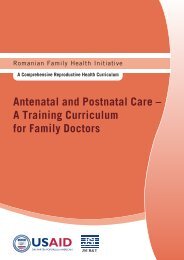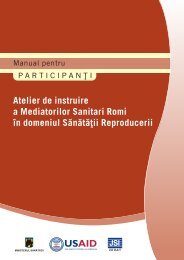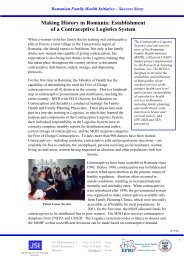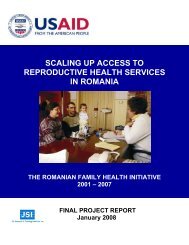Training of Roma Health Mediators in Reproductive Health
Training of Roma Health Mediators in Reproductive Health
Training of Roma Health Mediators in Reproductive Health
Create successful ePaper yourself
Turn your PDF publications into a flip-book with our unique Google optimized e-Paper software.
SESSION 11: INFERTILITY<br />
OBJECTIVES: By the end <strong>of</strong> the session, the participants should be able to:<br />
1. Name common causes <strong>of</strong> <strong>in</strong>fertility<br />
2. Describe general measures for reduc<strong>in</strong>g the risks <strong>of</strong> <strong>in</strong>fertility and for<br />
<strong>in</strong>vestigation <strong>of</strong> a <strong>in</strong>fertile couple<br />
TRAINING METHODS: Discussion, Presentation<br />
TIME: 30 m<strong>in</strong>utes<br />
MATERIALS:<br />
Tra<strong>in</strong>er document<br />
• Causes <strong>of</strong> Infertility<br />
INSTRUCTIONS:<br />
I. INFERTILITY – DEFINITION, CAUSES (15 m<strong>in</strong>utes)<br />
Refer to the last session and the fact that untreated STIs can lead to problems <strong>of</strong><br />
<strong>in</strong>fertility. Ask participants:<br />
‣ When you hear someone say that a man, or a woman or a couple is <strong>in</strong>fertile, what<br />
do you th<strong>in</strong>k that means?<br />
That the person, or couple, has difficulty hav<strong>in</strong>g (or is unable to have) a child.<br />
‣ In general, who is responsible for not be<strong>in</strong>g able to have a pregnancy/a child?<br />
Either the man or the woman, or both <strong>of</strong> them, may be unable to do their part <strong>in</strong> order to<br />
create a pregnancy/have a child.<br />
Expla<strong>in</strong> that:<br />
• Often the woman is blamed when she does not become pregnant. Even if the<br />
couple gets medical help, sometimes doctors will check only the woman for<br />
fertility problems. But just as <strong>of</strong>ten the man is the one who is <strong>in</strong>fertile. Neither<br />
men nor women should be blamed for <strong>in</strong>fertility. And both need support dur<strong>in</strong>g<br />
this difficult time. For a couple that wants to have children, <strong>in</strong>fertility can br<strong>in</strong>g<br />
sadness, anger, or shame.<br />
• A couple is said to be <strong>in</strong>fertile if the woman has not gotten pregnant after hav<strong>in</strong>g<br />
normal sexual <strong>in</strong>tercourse two-three times a week, without us<strong>in</strong>g any method <strong>of</strong><br />
contraception, for at least one year. In general, 80% <strong>of</strong> couples who are try<strong>in</strong>g to<br />
have a baby can achieve a pregnancy with<strong>in</strong> a year, and up to 90% with<strong>in</strong> 18<br />
months <strong>of</strong> try<strong>in</strong>g.<br />
• Infertility has many causes. Some causes <strong>of</strong> <strong>in</strong>fertility are preventable.<br />
176<br />
RFHI/JSI <strong>Roma</strong>nia <strong>Tra<strong>in</strong><strong>in</strong>g</strong> <strong>of</strong> RHMs <strong>in</strong> <strong>Reproductive</strong> <strong>Health</strong> Session 11: Infertility








